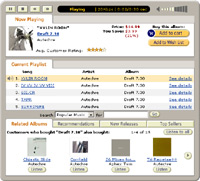Speedera Networks, a content delivery provider connecting more than 1,000 carrier backbones in the US, Europe and Asia-Pacific region has partnered with Macromedia to deliver video clips in Flash format.
Speedera manage the delivery of file downloads and media for companies that have no wish to host content themselves. Customers include Fox Broadcasting, AMD and NASA. No doubt Speedera were very busy this morning with everyone hitting the NASA site to see the transit of Venus.
Flash has come along way since the mid-90s when cropped-trousered Hoxtonites first used its sprite and vector-based tools to create annoying banner ads and awful games. Flash has matured to be an excellent development environment and has produced some truly great internet content. By incorporating a video engine based on Sorenson Media’s software, Macromedia are now pushing Flash in a direction that was never dreamed of when it first appeared. As en example, video conferencing application can be created in seconds by dragging objects to your work area, and can be highly customised with brand identity and further functionality.
Since there’s a Flash player on an estimated 90% of PCs out there, most users already have all that’s required to enjoy video embedded in a Flash object, as no further client software is required.
However, the reason that Flash video is not as prevalent as formats such as Windows Media is that Flash development tools are expensive, whilst Microsoft’s are free.
 Amazon.com have quietly rolled out a nifty new music preview feature, allowing much more convenient previews than before. The site’s erstwhile preview system was always a bit hit and miss, lacking in some obvious functions, but the new system, comprising of a pop-up box control panel with more than a whiff of iTunes about it is much better and demonstrates that it’s not just the better download sites that allow you to try before you buy.
Amazon.com have quietly rolled out a nifty new music preview feature, allowing much more convenient previews than before. The site’s erstwhile preview system was always a bit hit and miss, lacking in some obvious functions, but the new system, comprising of a pop-up box control panel with more than a whiff of iTunes about it is much better and demonstrates that it’s not just the better download sites that allow you to try before you buy.